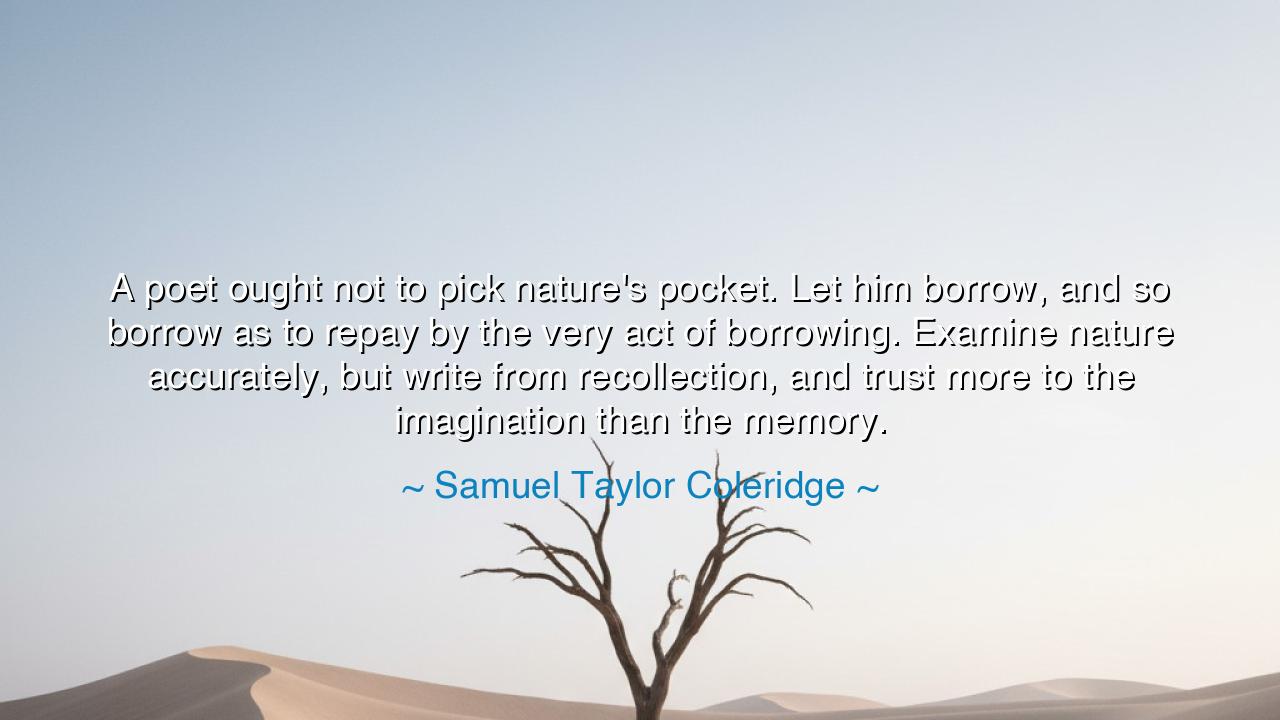
A poet ought not to pick nature's pocket. Let him borrow, and so
A poet ought not to pick nature's pocket. Let him borrow, and so borrow as to repay by the very act of borrowing. Examine nature accurately, but write from recollection, and trust more to the imagination than the memory.






“A poet ought not to pick nature’s pocket. Let him borrow, and so borrow as to repay by the very act of borrowing. Examine nature accurately, but write from recollection, and trust more to the imagination than the memory.” — so spoke Samuel Taylor Coleridge, a soul both philosopher and dreamer, who sought to uncover the sacred union between nature, imagination, and the creative spirit. These words are not merely counsel for poets, but a revelation for all who seek to transform what they see into what they mean. Coleridge reminds us that true art is not theft — it is transmutation. The poet does not take from the world; he communes with it, listens, learns, and then returns it, enriched and sanctified through the power of imagination.
When Coleridge warns against “picking nature’s pocket,” he speaks against the act of mere imitation. To steal directly from nature — to copy her surfaces without soul — is to produce only shadow, not substance. The poet who merely describes the rustling leaves or the breaking waves has captured only the husk of beauty. But the poet who observes, remembers, and then reimagines — who lets the image pass through the fires of emotion and spirit — creates something new, something that repays nature by magnifying her wonder. Thus, the artist becomes not a thief of creation, but a co-creator, one who borrows in order to bless.
In this, Coleridge stands apart from mere naturalism. He belongs to the order of poets who, like the ancients, understood that the outer world is a symbol of the inner one. He calls upon us to “examine nature accurately”, for knowledge is the beginning of art — yet to write “from recollection” means to let time and the soul reshape that knowledge into vision. In the quiet space between observation and creation, imagination works her alchemy. The raw fact is transformed into spiritual truth. The rainbow that once arched across the sky becomes in the poet’s hand a bridge between man and the divine.
Consider the example of William Wordsworth, Coleridge’s own companion in poetry and thought. When Wordsworth wrote of daffodils dancing beside the lake, he did not record them as a botanist would. He did not pluck them, measure them, or note their Latin names. Instead, he beheld them in solitude, and later, when memory softened into vision, he wrote of how they lived within him: “They flash upon that inward eye / Which is the bliss of solitude.” In that moment, the flowers ceased to be flowers — they became joy, remembrance, and the song of the eternal. Wordsworth, like Coleridge, understood: to describe nature truly, one must first let it live in the imagination.
Coleridge’s teaching also bears moral weight. To “repay by the very act of borrowing” is to live with reverence. The poet who uses the world without gratitude is as one who consumes the feast but honors not the host. But the true artist repays by giving beauty back — by awakening others to the splendor that already surrounds them. In this way, the poet becomes priest and prophet, restoring to humanity the sense of wonder it has forgotten. What he borrows from nature, he returns multiplied in spirit.
Yet there is also discipline in this command. To “trust more to the imagination than the memory” is not to abandon truth, but to elevate it. Memory binds us to what was; imagination opens us to what might be. The poet’s duty is not to record but to reveal — to take the visible and unveil the invisible meaning beneath it. Thus, imagination is not falsehood, but truth transfigured. It is the sacred fire by which the ordinary is made holy.
And so, the lesson for every seeker, artist, or thinker is this: learn to see deeply, but do not be enslaved by sight. Look upon nature with awe, but do not grasp her too tightly. Let her images enter your heart, let them dwell there, and when they return — altered by reflection and feeling — they will be radiant with new life. Do not steal from the world; create with it. For imagination is the breath by which the soul reshapes reality, and art is the act of giving back to creation what creation first gave to you.
In this balance — between seeing and dreaming, between borrowing and repaying — lies the eternal rhythm of the poet’s work. To imitate is to echo; to imagine is to sing. And when the poet sings, nature herself listens, smiling, for she knows her beauty has not been stolen — it has been reborn.






AAdministratorAdministrator
Welcome, honored guests. Please leave a comment, we will respond soon